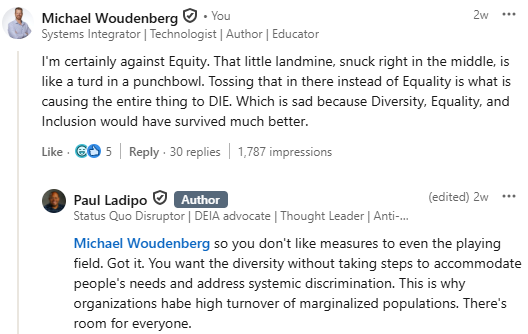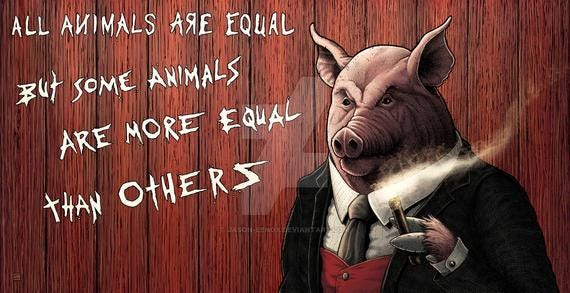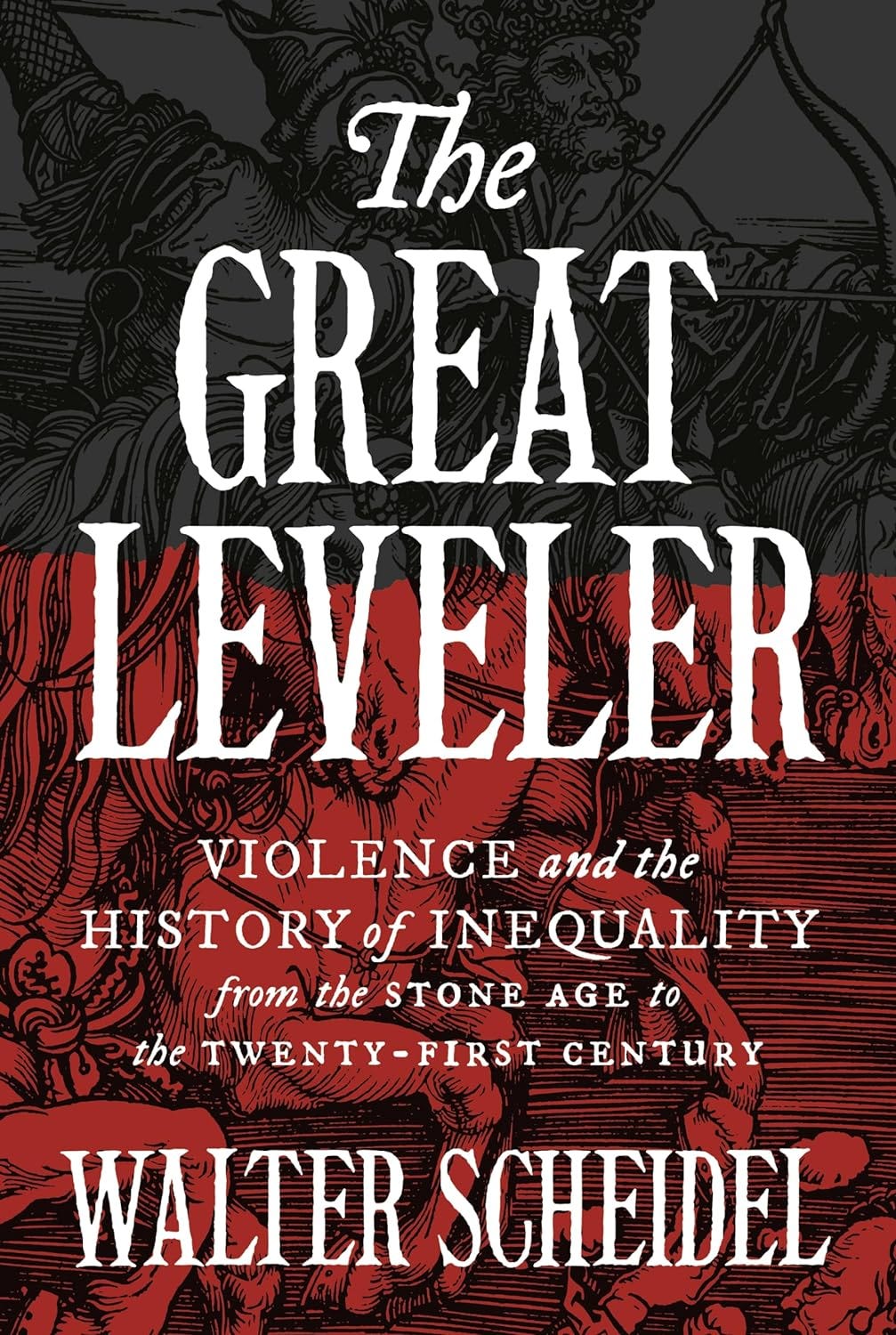The Death of Diversity and Inclusion
The Equity Landmine
Welcome to Polymathic Being, a place to explore counterintuitive insights across multiple domains. These essays explore common topics from different perspectives and disciplines to uncover unique insights and solutions.
Today's topic focuses on Equity and how this complicated term has a long and sordid history, currently contributing to the death of Diversity and Inclusion. It’s an important topic because diversity is critical to polymathic thinking, and inclusion is essential for aspiring polymaths who tend to buck the status quo.
🎧Prefer to listen? You can find these essays on all major podcast players!
Intro
Diversity, Equity, and Inclusion, known by the more familiar acronym DEI, has come under scrutiny over the past five years, not just for the abject failure of the initiative but also the backlash over the inequality of how DEI is applied. From the elimination of affirmative action admissions, to lawsuits against quota hiring and promotions, to the recent Executive Orders the current U.S. administration has levied against the practice in government-funded activities, the pushback is strong.
The reaction to this pushback is also strong, as demonstrated by a recent LinkedIn post, which stated, “If you're against DEI, just say it with your whole chest: you are against diversity, equity, and inclusion.” What followed in the post was the typical and, I’ll clarify, laudable reasons for diversity and inclusion, but I commented with a specific critique that ended up igniting a firestorm:
I'm certainly against Equity. That little landmine, snuck right in the middle, is like a turd in a punchbowl. Tossing that in there instead of Equality is what is causing the entire thing to DIE. Which is sad because Diversity, Equality, and Inclusion would have survived much better.
As is typical, the post’s author replied with a strawman argument right from the start, without considering anything I said. It’s a great example of why Steelmanning is a better method, as the entire thread contained one logical fallacy after another, with people attempting to defend equity and ultimately proving my point over and over. It also exemplifies the type of argument that often occurs around equity, which is precisely why I described it as a turd and why it contributes to the death of DEI.
The Death of DEI
Since the acronym was coined, the astute observer recognized that a simple shift of order rewrites it to DIE. As I said in my responses, I think it was a foretelling and also not ironic that Equity is splitting Diversity and Inclusion and causing that very death.
And who, really, is against Diversity and Inclusion? We all have different levels of what’s tolerable, but outside of a hardcore racist, these two words are touchstones for what makes cultures great. Even at the most micro-level, we all like a diversity of entertainment, food, and even friends, and we all appreciate inclusion. As that spreads out, you’ll find even the most xenophobic individual still has a sizeable tolerance for both Diversity and Inclusion. The nuance is that it’s not unfettered.
While bracketted by Diversity and Inclusion, the DEI ecosystem is typically focused on Equity, which sounds great on an initial read:
Equality provides everyone with the same resources and opportunities, regardless of individual needs. Equity, on the other hand, recognizes that people have different needs and circumstances, and provides tailored resources and support to ensure everyone has a fair chance to succeed.
Another way to describe equity is equal outcomes, whereas equality refers to equal opportunity. The image below captures this idea of equity, where each person can now see the baseball team over the fence because they’re provided unequal support.1
This fact highlights the first of two challenges with equity:
First, it’s not equal at all and is subject to significant bias in who should get what help. We saw this manifest with the college admission scandals, where Asians were thumbed down in standardized tests and others were elevated in an attempt to equalize the outcome. Equity is an attempt to mitigate bias, which carries significant risk in getting it right while always appearing unfair to everyone else.
This thread also undermines the inherent capability and agency of those we deign to help, as Dr. Nafees Alam recently wrote:
Rather than equality, or even empowerment, they’ve decided upon equity: predetermining the end results regardless of our efforts. It’s as though they don’t believe we can thrive on our own the way that they can.
The second challenge is the true landmine baked into equity based on the attempts to apply the concept over the past 150 years. A long train of history follows equity and its roots in Marxist ideology as so poignantly demonstrated by George Orwell in Animal Farm, where “All animals are equal but some animals are more equal than others.” This occurs because, when you’ve got your fingers on the scale in an attempt to ‘level’ the playing field, it always ends up tipping toward the benefit of those whose fingers are involved.
The outcome of Equity in DEI is a hyperfocus on differences and the laudable goal of elevating everyone, as that meme illustrates. The problem is that it’s really hard to elevate everyone, and the more you elevate others, the more fractured society becomes as everyone attempts to claim their own, unique differences. The consequence, as the book The Great Leveler highlights, is that the easiest way to remove inequality is through catastrophe.
If there’s anything the application of Marxism has demonstrated, it is that its reduction of inequality always goes in the opposite direction of elevation. In Soviet Russia, everyone was equal; equally poor, hungry, miserable, and afraid. They achieved equality of outcome for everyone but the elites. The same outcomes are being seen in DEI initiatives today, as evidenced by the lowered expectations for college admissions, medical schools, poetry, and even objective truth.2 This is the landmine of equity, which causes the death of DEI
The Larger Challenge
Swinging back to that LinkedIn post, in their defense of DEI, none of those commenting on my observation demonstrated the bare semblance of interest in the diversity I added. They certainly showed no inclination toward inclusion while using every tactic and logical fallacy in the book to shut down the conversation and exclude my contribution.
This conversation highlights how equity can become a tool for the weaponization of toxic empathy. They care so much about inequality that they’re willing to attack anything that gets in the way of equal outcomes, including a dramatic reduction in tolerance for actual Diversity and Inclusion. We’ve explored this before in [In]Human Resources, where HR was keen to whitewash true diversity, not with equality, but to achieve balanced, equitable outcomes, which ultimately killed inclusion.
Even the image of the three people watching a ballgame raises a significant question: Why are they standing behind a fence, nominally designed to keep people out, instead of sitting in the stands with everyone else? Because those stands are designed to maximize the viewing capability of all people, complete with booster seats, handicap accessibility, and more. I honestly believe this highlights the lack of critical thinking on the whole systems perspective that I see most often within DEI. It’s the optimization of the wrong thing at the expense of the overall value.
Simply put, that meme is a perfect example of how it’s easy to see ‘inequality’ in the first panel and quickly feel validated for the tailored equity in the second panel. In contrast, many of us are wondering why you don’t just get them in the game like everyone else, which is, ironically, a matter of equality, not equity.
Amri B. Johnson, who writes Reconstructing Inclusion , fights back against the same challenges when he shares insights exclusively for this essay:
Equality or "equity" of outcomes is unrealistic and has been radicalized by the pro and anti-DEI in ways that don't serve companies or society. My experience is that results come from creating the conditions for everyone to thrive. Unfortunately, it doesn't guarantee that everyone does, but organizations benefit from discovering pathways to increase positive outcomes for greater numbers of employees.
He's talking about empowerment and equality, which is a healthy model for DEI that identifies the dangers of equity and provides actionable insight for achieving diversity and inclusion:
Summary
I maintain my stance against Equity. It remains a turd in a punchbowl, causing the death of DEI because the fight to defend Equity comes at the cost of Diversity and Inclusion. We’re all supposed to ignore this consequence while patting each other on the back and pretending we solved something. At the same time, the most ardent DEI advocates react to any deviation, any diversity of thought, with condemnation.
It annoys me because Diversity, Equality, and Inclusion would have survived better, and it’s a mantra that resonates with even hardcore conservatives, bridging a political divide. That’s important because diversity is key to polymathic thinking, and inclusion is essential for aspiring polymaths who buck the status quo regardless of politics.
Did you enjoy this post? If so, please hit the ❤️ button above or below. This will help more people discover Substacks like this one, which is great. Also, please share here or in your network to help us grow.
Polymathic Being is a reader-supported publication. Becoming a paid member keeps these essays open for everyone. Hurry and grab 20% off an annual subscription. That’s $24 a year or $2 a month. It’s just 50¢ an essay and makes a big difference.
Further Reading from Authors I Appreciate:
I highly recommend the following Substacks for their great content and complementary explorations of topics that Polymathic Being shares.
Goatfury Writes All-around great daily essays
Never Stop Learning Insightful Life Tips and Tricks
Resilient Mental State Toughen your body and your mind
Educating AI Integrating AI into education
Socratic State of Mind Powerful insights into the philosophy of agency
This image is the go-to for DEI conversations and it showed up in a patronizing comment on that LinkedIn Post as well.
For a much deeper dive, check out James Lindsey’s workshop on the topic.











I agree with you, but I think equality is just as broad a term as equity. Equality of what? Outcomes?
That LinkedIn post legitimately made me laugh out loud and this post, like all of your posts, legitimately made me better.